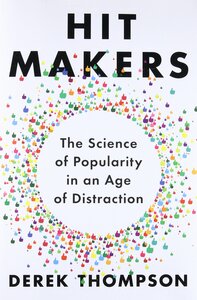Take a photo of a barcode or cover
informative
reflective
medium-paced
Very interesting, recommended for those in charge of business and market development.
This is an exceptional book. Thompson takes the reader on a tour de force of hit makers, across centuries, across media and business, and distills lessons to be learned.
But the primary takeaway is this: The chances of a hit of any kind can be influenced but not predicted.
But the primary takeaway is this: The chances of a hit of any kind can be influenced but not predicted.
informative
inspiring
medium-paced
We’ll written and empowered me to think more critically of “hits”. Which, admittedly, has allowed me to enjoy hits on a deeper level.
Also a call to action of breaking outside of my comfort zone to explore ideas that I am unfamiliar with, and as such, do not like. Thompson quotes Abraham Lincoln, “I do not like that man, I must get to know him more”, and asks how powerful this would be if we approached ideas this way. After reading this book, I am inspired to read other books that are outside my domain of interest.
The book is a melange of interesting ideas and threads that, I felt, lacked a grand unifying structure. It was as if the author got excited about uncovering a new idea and left the thread that he was pursuing to go down another path.
An interesting read despite this criticism. . .
An interesting read despite this criticism. . .
informative
inspiring
reflective
medium-paced
As someone in the book marketing and distribution business, I found this book incredibly insightful and perspective changing. It provides a new way to look at vitality, popularity and discoverability. Would recommend to any marketers working with creative works or brands. My favorite line: "Content might be king, but distribution is the kingdom."
Thompson writes very well, and is able to engage us in stories and facts. He's a journalist and uses this book to go much further than he could with just simple articles. You'll be surprised and gain a lot of insight into contemporary culture, which will make you think about what you like and dislike and why.
This is not the dry academic book, it uses very good storytelling and lots of techniques to maintain the reader interested. On the other side it encompasses too many perspectives, approaches and cultural production that makes it impossible to deliver the promise made by the title. There's really no science in these pages, but only lots of stories, causalities and correlations. Even if Thompson starts with determination and convincing us, bit by bit he acknowledges the impossibility of the task he purposed to achieve. Therefore it's up to you, the reader, to extract the best from it, and build your theories on how successes are made.
A more in depth review was made for my blog: https://virtual-illusion.blogspot.pt/2017/06/o-gosto-nao-existe-multiplas-ideias.html
This is not the dry academic book, it uses very good storytelling and lots of techniques to maintain the reader interested. On the other side it encompasses too many perspectives, approaches and cultural production that makes it impossible to deliver the promise made by the title. There's really no science in these pages, but only lots of stories, causalities and correlations. Even if Thompson starts with determination and convincing us, bit by bit he acknowledges the impossibility of the task he purposed to achieve. Therefore it's up to you, the reader, to extract the best from it, and build your theories on how successes are made.
A more in depth review was made for my blog: https://virtual-illusion.blogspot.pt/2017/06/o-gosto-nao-existe-multiplas-ideias.html
Wildly interesting and insightful. An important thesis that nothing in markets is naturally occurring but is designed, curated, and marketed by people with power and influence.
This book spans architectural styles, famous painters, pop music, news media, and beyond. In all fields, consumers of media, art, music, products, etc. have the illusion of being in control and influencing the direction of each field, but they in fact are being fed expertly and systematically curated content, ideas, history, aesthetics, etc. that are designed precisely to attract them and make those in power more money.
This book is really eye opening to the broad systems that have been around for centuries that influence market and consumer perception of power and influence all while never actually giving consumers power or influence. In the end, I found this interesting and convincing (though often times boring and ineffectual).
Worth a read and a reminder that there’s A LOT of people perpetually marketing ideas and things and styles and histories to us all with the design of gaining favor, profit, preference, or network expansion; none of which are usually innately deserved or justly earned. At the very least, it’s useful to understand the psychology behind “hitmaking” and the deeply entrenched manipulative economic systems that have been running the show for so sooo long in every field imaginable.
This book spans architectural styles, famous painters, pop music, news media, and beyond. In all fields, consumers of media, art, music, products, etc. have the illusion of being in control and influencing the direction of each field, but they in fact are being fed expertly and systematically curated content, ideas, history, aesthetics, etc. that are designed precisely to attract them and make those in power more money.
This book is really eye opening to the broad systems that have been around for centuries that influence market and consumer perception of power and influence all while never actually giving consumers power or influence. In the end, I found this interesting and convincing (though often times boring and ineffectual).
Worth a read and a reminder that there’s A LOT of people perpetually marketing ideas and things and styles and histories to us all with the design of gaining favor, profit, preference, or network expansion; none of which are usually innately deserved or justly earned. At the very least, it’s useful to understand the psychology behind “hitmaking” and the deeply entrenched manipulative economic systems that have been running the show for so sooo long in every field imaginable.






